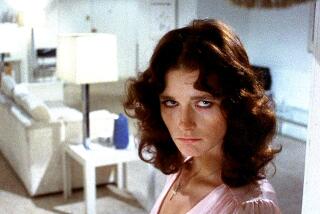Review: Lars von Trier’s ‘The House That Jack Built’ is mostly empty
- Share via
The idea of Danish filmmaker Lars von Trier’s new “The House That Jack Built” is the most exciting thing about it. Can the notorious provocateur prince of international art cinema use the forensic procedural of a serial killer story to interrogate his own internalized misogyny and the complicated relationship to women within his own artistic practice?
Alas, it remains largely just that — a provocative idea executed with a halfhearted commitment.
Von Trier earned his reputation with such works of formal invention and transgressive thematic daring as “Breaking the Waves” and “Dancer In the Dark” that could shock and move audiences in equal measure. But as his compulsive need for public provocation began to overwhelm the merits of his artistic output, he has become more and more of a willful outsider. He managed to self-immolate one of his richest films, 2011’s “Melancholia,” by making off-the-cuff Nazi jokes during a Cannes Film Festival news conference.
His latest movie move shows that his lesser tendencies still have him in their grip, as the film revels in grisly, in-your-face violence and wan philosophical digressions. “Jack” premiered at Cannes earlier this year and also screened in recent limited one-off engagements in its ultra-violent director’s cut. The movie receives its official theatrical release in a R-rated version that is 5 minutes shorter.
Von Trier has spoken about his struggles with depression and with alcohol, and it seems that every film he makes nearly breaks him, which may partly explain the sense of diminishing returns across his last few films. At one point in “Jack,” Von Trier includes images from some of his previous films, in case anyone was wondering who he considers to be the real star of the movie.
The story, as such, revolves around a character named Jack (Matt Dillon), an engineer who wants to be an artist in Washington state, over a 12-year period in the 1970s and ’80s. Jack’s real passion is murder, mostly of women.
The film is structured around Jack telling his tale to Virgil (Bruno Ganz) while being led on his way to hell, a nod to Dante’s “Divine Comedy.” The movie continually cuts back to archival footage of the pianist Glenn Gould, pushing the notion that Jack is a frustrated artist attempting to bend the world to his will and express the vision he has inside him. (And Von Trier himself perhaps attempting to cryptically respond to/rationalize his reputation for being difficult to his performers.) Once the topic of conversation turns to Albert Speer, Nazi architecture and Holocaust atrocity footage, it feels as if the filmmaker is just looking to troll audiences like an argumentative online commenter.
Dillon feels a bit lost for much of the movie, seemingly asked to play Jack as something of a blank slate, devoid of empathy or understanding and prone to frustrated rage when things don’t go as planned.
The way Dillon and Von Trier attempt to work in tandem brings to mind the recent collaboration between actor Ethan Hawke and filmmaker Paul Schrader on “First Reformed,” another instance of a onetime youthful heartthrob now in middle age and a writer-director who has at times seemed lost in the tides of his career. Yet Hawke and Schrader elevated and brought the best out of each other, while Dillon and Von Trier often seem confused and at odds, as if one was not understanding the intentions of the other.
As Jack’s victims, Uma Thurman and Siobhan Fallon Hogan aren’t given much to do except serve as functionaries of the story, while Sofie Grabol makes a stronger emotional impression as a woman attempting to protect her two sons. It is Riley Keough who is allowed to seem like the fullest character in the entire movie as a woman coming to realize what her fate is about to be. If Keough’s character, or any of Jack’s victims, had been given more consideration by Von Trier’s storytelling, it would provide a welcome counterbalance to Jack’s egomaniacal musings and rantings, giving the movie a stronger core and its examination of Jack’s true self a clearer focus. (Keough also gets the movie’s best line when she says simply, “You’re weird.”)
“The House That Jack Built” is a disappointment for many different reasons, not least of them being that it is not a total and utter failure. Then one could just dismiss it outright and be done with it. But Von Trier has managed to cobble together just enough of interest — odd moments, pieces of performance, stray ideas and the simple audacity of putting this mess out into the world, that it feels like there may be something there worth considering, a maddening possibility. And that may be his cruelest prank of all.
------------
‘The House That Jack Built’
Rating: R, for strong disturbing violence/sadistic behavior, grisly images, language, and nudity
Running time: 2 hours, 30 minutes
Playing: In limited release
SIGN UP for the free Indie Focus movies newsletter
More to Read
Only good movies
Get the Indie Focus newsletter, Mark Olsen's weekly guide to the world of cinema.
You may occasionally receive promotional content from the Los Angeles Times.











